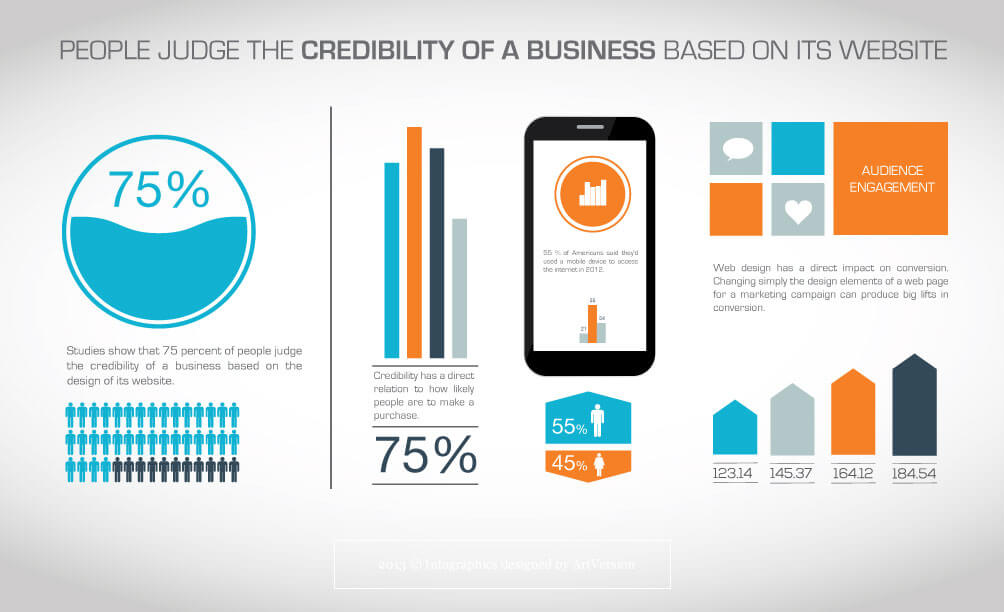In today’s digital age, the importance of having a professional and well-maintained website for your business cannot be overstated. For many small companies, the idea of developing and maintaining a website might seem daunting due to perceived high costs and the ongoing commitment required. However, the absence of an online presence can significantly hinder your business’s growth and reputation over time.
Think about it: What’s the first action you take when you hear about a new company? You search for them online. But what happens if they don’t have a website? Your interest quickly wanes, and you move on to a competitor. This simple scenario highlights the crucial role that a website plays in the modern business landscape.
The Imperative of a Professional Website

Credibility and Trust Building
A poorly designed website can be more damaging than not having one at all. Users are quick to judge a company’s credibility based on its website. An astounding 88% of online consumers are less likely to return to a site after a bad experience, according to Econsultancy. Therefore, a professional, aesthetically pleasing website is essential to creating a positive first impression and building trust with potential customers.
Your website is a reflection of your business. It’s a space where you can showcase your professionalism, values, and what makes your company unique. Investing in a skilled web designer who understands your business goals can significantly enhance your online presence, making it easier to convert visitors into loyal customers.
A well-crafted website also serves as a testament to your business’s legitimacy. When you can direct customers, partners, potential employees, or investors to your website, it underscores that you are a serious and established entity in your industry.
Enhancing Online Visibility
In an era where the internet is the primary source of information, having a robust online presence is non-negotiable. Most people rely on search engines like Google, Bing, and Yahoo! to find products and services. By having a website, your business becomes discoverable to a vast audience searching for related terms.
It’s also crucial to note that approximately 80% of internet users access the web via mobile devices. This statistic underscores the importance of ensuring your website is mobile-friendly. Responsive web design is vital as it ensures your site functions well on various devices, from smartphones and tablets to smart TVs. A seamless mobile experience not only improves user satisfaction but also positively impacts your search engine ranking.
Outshining the Competition
In today’s competitive marketplace, not having a website can put you at a significant disadvantage. Whether you’re a small startup or an established enterprise, the online space is where you compete for customers’ attention. A professional, attractive, and trustworthy website can differentiate you from your competitors.
Even if your competitors are larger or more established, a well-designed website can level the playing field. By effectively showcasing what makes your business unique and providing valuable information, you can attract and retain customers who might otherwise choose a competitor.
Key Benefits of Having a Business Website
1. Round-the-Clock Accessibility
One of the most significant advantages of having a website is that it provides round-the-clock accessibility. Unlike a physical store with fixed operating hours, your website is available to customers 24/7. This constant availability means that potential clients can learn about your products or services and make purchases at any time, catering to their convenience and schedules.
2. Cost-Effective Marketing
Traditional marketing methods, such as print advertising and direct mail, can be expensive and often have limited reach. In contrast, a website offers a cost-effective marketing solution with the potential to reach a global audience. By implementing search engine optimization (SEO) strategies, you can improve your website’s visibility and attract organic traffic without the recurring costs associated with traditional advertising.
3. Showcasing Products and Services
Your website serves as a digital showcase for your products and services. You can provide detailed information, high-quality images, and even videos to help potential customers understand what you offer. This level of detail can significantly influence purchasing decisions and enhance customer satisfaction.
4. Building Customer Relationships
A website provides various tools to engage with customers and build lasting relationships. Features such as contact forms, live chat, and customer feedback options allow you to interact directly with visitors, address their concerns, and provide personalized support. Additionally, maintaining a blog or news section can keep your audience informed about industry trends, company updates, and special promotions.
5. Analytics and Insights
Websites equipped with analytics tools can provide valuable insights into customer behavior and preferences. By analyzing metrics such as visitor demographics, page views, and conversion rates, you can make data-driven decisions to optimize your marketing strategies and improve overall business performance.
Overcoming Common Objections
Despite the clear benefits, some small business owners hesitate to create a website due to misconceptions about cost and maintenance. Let’s address these concerns:
Cost Concerns
While developing a high-quality website requires an initial investment, the long-term benefits far outweigh the costs. There are various options available to suit different budgets, from using website builders with pre-designed templates to hiring professional web designers for a custom site. Additionally, the return on investment (ROI) from increased visibility, customer trust, and sales can quickly justify the initial expenditure.
Maintenance and Updates
Maintaining a website does require ongoing attention, but modern content management systems (CMS) such as WordPress have made it easier than ever to update content, add new features, and ensure security. Many web development agencies offer maintenance packages, or you can hire an in-house webmaster to handle these tasks. Regular updates not only keep your website fresh and engaging but also help with SEO rankings.
The Role of SEO in Website Success
Search Engine Optimization (SEO) plays a critical role in ensuring your website’s success. SEO involves optimizing your website’s content, structure, and technical aspects to improve its visibility on search engines. Here are some key SEO strategies to consider:
1. Keyword Research
Identify relevant keywords that potential customers might use to search for your products or services. Incorporate these keywords naturally into your website content, including titles, headings, and meta descriptions, to improve your chances of ranking higher in search results.
2. Quality Content
Creating high-quality, informative content is essential for SEO. Regularly updating your website with blog posts, articles, and other valuable content can attract and retain visitors while signaling to search engines that your site is active and relevant.
3. On-Page Optimization
Ensure that each page of your website is optimized for search engines. This includes using proper heading tags (H1, H2, etc.), optimizing images with alt text, and ensuring fast page load times. A well-structured site makes it easier for search engines to crawl and index your content.
4. Backlink Building
Earning backlinks from reputable websites can significantly boost your SEO efforts. Engage in guest blogging, partnerships, and other link-building strategies to enhance your website’s authority and credibility in the eyes of search engines.
5. Local SEO
For businesses with a physical location, local SEO is crucial. Optimize your website for local search by including location-specific keywords and creating a Google My Business profile. This helps potential customers find your business when searching for services in your area.
Integrating Social Media
In addition to having a website, integrating social media into your online strategy can further enhance your business’s visibility and customer engagement. Social media platforms like Facebook, Instagram, Twitter, and LinkedIn offer unique opportunities to connect with your audience, share content, and drive traffic to your website.
Content Sharing
Regularly share your website content on social media to reach a broader audience. This can include blog posts, product updates, customer testimonials, and behind-the-scenes glimpses of your business. Social media sharing can increase your website’s visibility and attract new visitors.
Customer Interaction
Social media allows for direct interaction with your audience. Responding to comments, messages, and reviews demonstrates your commitment to customer satisfaction and builds a sense of community around your brand.
Advertising Opportunities
Social media platforms offer targeted advertising options that can drive traffic to your website. By creating tailored ad campaigns, you can reach specific demographics and interest groups, increasing the likelihood of attracting potential customers.
Conclusion: Embrace the Digital Era
The role of websites in modern business is multifaceted and indispensable. From establishing credibility and enhancing visibility to outshining competitors and leveraging SEO, a professional website is a cornerstone of business success. While the initial investment and maintenance may seem challenging, the long-term benefits far outweigh the costs.
As a business owner, embracing the digital era and investing in a high-quality website is one of the most strategic decisions you can make. Not only will it help you reach a broader audience, but it will also position your business as a credible and competitive player in your industry.
In conclusion, the benefits of having a website are clear and compelling. By prioritizing your online presence, you can ensure your business thrives in an increasingly digital world. Whether you choose to build a website yourself, use a website builder, or hire a professional, the key is to get started and continually optimize your site to meet the evolving needs of your customers and the market.
Cultura Interactive is a full service, web design agency that strives to not only create unique and attractive websites, but also helps businesses improve their internet marketing strategies in a less-complicated way.
Our team of professionals specialize in WordPress development, eCommerce, and responsive web design. Learn more about our services or contact us for a personal interview.



